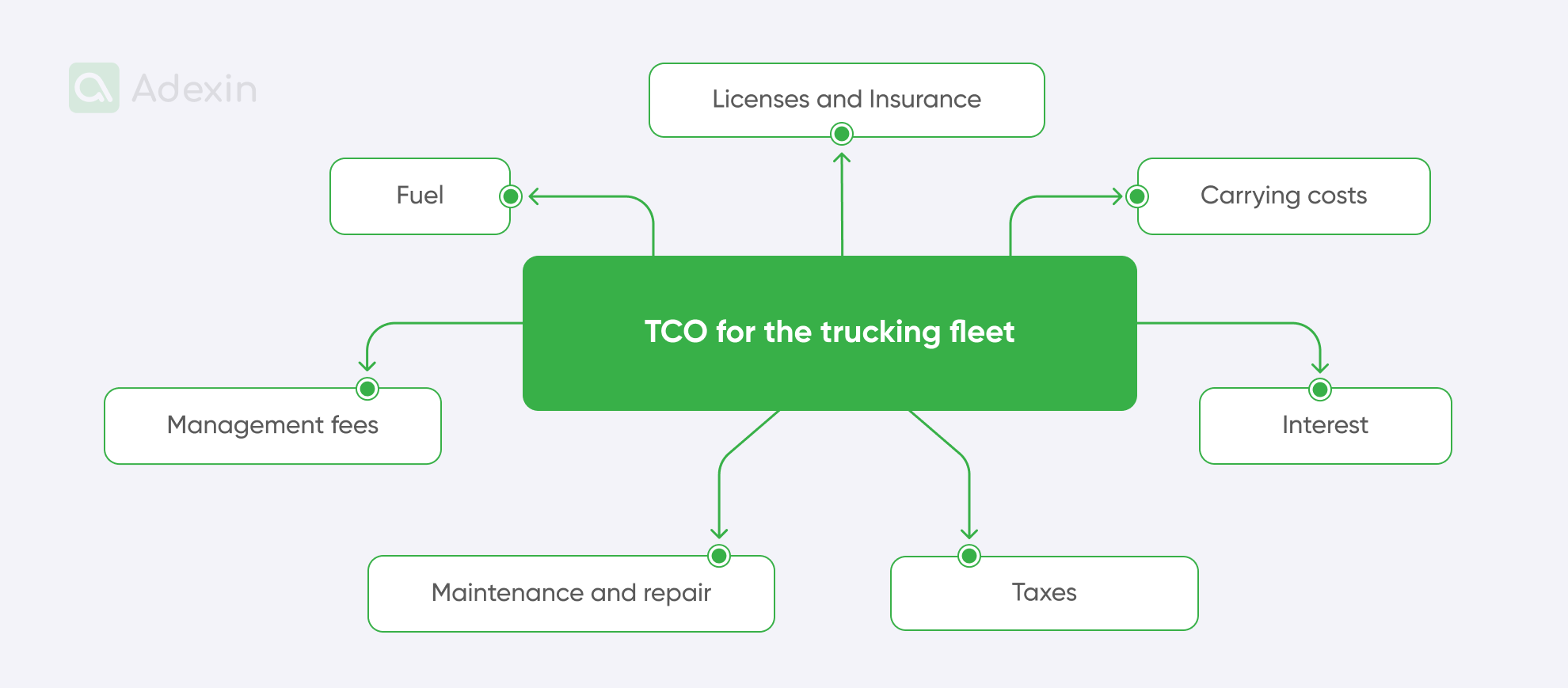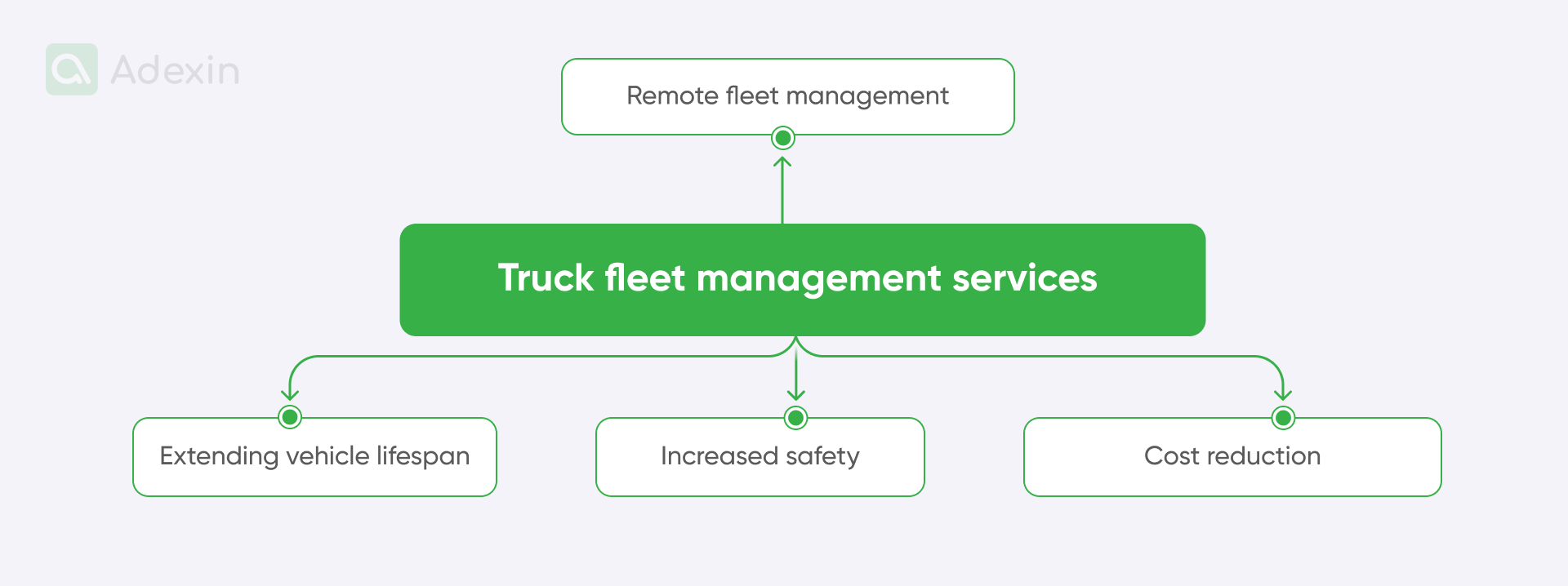Truck fleet management is a comprehensive task that requires complex knowledge about the logistics, distribution, and supply chain industry. Knowing the interdependencies in these industries from every angle allows us to create a holistic view of what is required for effective truck fleet management. In this article, we will broaden your knowledge about particular areas that are required to manage trucks and all connected assets in your organization. We'll shed light on the value that you acquire from fleet management software. By combining perspectives from different angles, you'll gain a higher recognition of what is needed to run your transportation operation more effectively. Let's see together how you can improve your transportation business.
What are the characteristics of a trucking fleet in logistics?
As we mentioned in the very first instance, the first step to validate truck fleet management costs should start from a good understanding of the total costs of ownership (TCO). These can include different variables depending on your assets. For example, management costs for electric vehicles will vary much more from those that operate on regular fossil fuels. Different considerations about sustainability will also come to light, but at first, all that must comply with our business goals. These will always be ahead to provide indicators that can position your business on the top of the competition and, at the same time, remain cost-effective.

We have selected the most important indicators for analyses of the total costs of ownership for the truck fleet. Here, you may find elements that should be included in your cost analysis for fleet management:
Fuel – encompasses all costs related to fuel or electricity (in the case of electric vehicles).
Carrying costs - includes depreciation.
Management fees - involve office expenses, fleet management software costs, Control Tower costs, labor hours, HR support, labor rates, and general fleet management.
Maintenance and repair - cover spare parts costs, washing, roadside service, substitute vehicle, fueling service, and battery maintenance and service for electric vehicles.
Taxes - consist of disposal costs, taxes, and disposal value.
Interest - incorporates the purchase price for new trucks, driver fees and salaries, and equipment for maintenance stations.
Licenses and insurance - encompasses legal, regulatory, licensing, and insurance expenses.
The biggest enemy of a successful business management approach is the presence of so-called "hidden" costs. This boils down to the fact that some managers make fleet decisions largely based on gut feelings. In many cases, decisions are made without meticulous consideration of all fleet management expenses. This is why small and medium businesses often need help with fleet management, as they need a detailed evaluation process. However, some decisions are made with multiple blind spots.
To address this gap, the business needs to invest in truck fleet management software. By using such a solution, companies can become more effective in managing narrow margins, which are a necessity in logistics, transportation, and the supply chain business to remain competitive.

Logistics fleet management in 10 easy steps for effective management
A comprehensive view of fleet management costs is often elusive. This means that we cannot predict all expenses that may occur, but we can certainly take the right precautions to manage them better.
One obstacle to assessing the total cost of ownership (TCO) is the frequent need for more awareness of their costs among fleet managers. While companies with extensive fleets may have a comprehensive understanding of their actual expenses, small fleet owners often need help estimating their costs. Getting an accurate estimate of the purchase price or tax rate can be relatively simple, but other costs still need to be more transparent.
Here, we have selected 10 crucial steps that are essential for effectively managing your truck fleet:
Keeping accurate records. Keep accurate records of vehicles, including maintenance schedules, repairs, and fuel consumption.
Implement fleet management software. Use technology to better organize your business activities. Fleet management software can help track vehicles, manage maintenance schedules, and monitor fuel consumption.
Driver development and training programs. Invest in ongoing training for drivers. This will ensure that they are up to date on safety protocols. They can help you with fuel-efficient driving practices and will be more familiar with vehicle operation.
Provide regular vehicle maintenance. Schedule routine maintenance checks to prevent breakdowns and extend the life of vehicles.
Fuel efficiency initiatives. Implement strategies to improve fuel efficiency, such as regular engine re-tuning, proper tire inflation, and route optimization. You can also consider hybrid engines or completely move to green energy, utilizing electric vehicles in your truck fleet.
Keep safety protocols. Establish and enforce safety protocols for drivers. This may include regular safety meetings to ensure compliance with traffic regulations, etc.
Telematics for monitoring. Use telematics systems to monitor vehicle performance and track location. In this way, you can collect data on driver behavior. This technology can offer valuable information for better decision-making.
Route optimization. Optimize routes to reduce mileage and travel time. This not only saves fuel but also improves overall performance. You can get this ability with software solutions for route optimization.
Regular performance reviews. Conduct regular reviews of your fleet's performance indicators (key performance indicators). Identify areas for improvement and implement necessary changes to increase efficiency.
Environmental considerations. Explore environmentally friendly practices, such as the use of fuel-efficient vehicles. You can reduce your carbon footprint and potentially save on fuel costs but also get more customers who are considered in their procurement of green technology partners and fleet decarbonization.
Streamlined dispatching. Fleet management custom software offers instant access to fleet location. You can process vehicle requests and work performance. In that way, you can eliminate the need for radio communication with dispatchers.
Truck fleet management services: where to find the best?
Outsourcing service for your truck fleet management can be challenging. Nevertheless, the best-known solution is to provide truck fleet management based on a software solution. Here, we need to lean on the two ways where we can implement software. The first software solution is commercial off-the-shelf, where we can get a ready-made solution for our fleet management, but most certainly, we will need more control over our expenses. There is a lack of features that can help manage transportation most effectively.
The second option is to put our focus on custom software development services for our truck fleet management. Just take a look at our example of the truck owner assistance app, which allows tracking cargo from pickup to delivery and payment, and improves the submission of documentation at the time of delivery. The application also includes tools for managing and executing agreements with shippers and brokers, as well as confirming purchase rates.

Here, we have selected the advantages of using custom software for fleet management:
Remote fleet management. Implementing the custom software allows you to monitor all aspects of your fleet's daily operations remotely.
Extending vehicle lifespan. Use GPS tracking to monitor vehicle performance, including mileage, tire wear, braking habits, and oil changes, extending the life of each vehicle.
Increased safety. Custom fleet management software can include a driver behavior component with video recording, which monitors driver habits to prevent damage and improve overall safety.
Cost reduction. Integrated tools, such as GPS tracking, provide insight into fleet costs. This enables managers to make informed decisions about cost reductions and operational improvements.
Truck fleet management system: total costs involved
We can state that costs for fleet management vary a lot. We may consider the capabilities of your fleet of trucks based on where they are destined. You may use your fleet for FMCG goods, which may require additional costs that come along with refrigerated trailer maintenance. All that will be related to the complexity of your business and customer demand. Here, we have summarized the elements of a truck fleet management system, which are translated into the costs arising from custom software development. Of course, this solution is part of a larger whole that addresses the entire range of transportation best practices.
The list below includes system features that are combined into the total costs of the system:
Vehicle tracking
Maintenance planning
Fuel management
Driver management
Route optimization
Safety and regulatory compliance
Cost tracking and analysis
Communication systems
Reporting and analysis
Integration with other systems
Security functions
Integration with telematics and IoT
Are you in search of a reliable tech partner?
Adexin can help with advanced logistics solutions
Contact usFinal takeaway
Understanding the total cost of ownership in truck fleet management is critical to trucking operations. Investing in software solutions to increase efficiency can reduce business costs.
Adexin is providing a custom software solution for truck fleet management for small and medium-sized businesses. We also have a proven track record of supporting system implementation with larger logistics and transportation solution providers. We maintain our customer-centric approach to provide our customers with the best possible solution at affordable prices. Contact us today, and let's see what we can deliver to your business.

